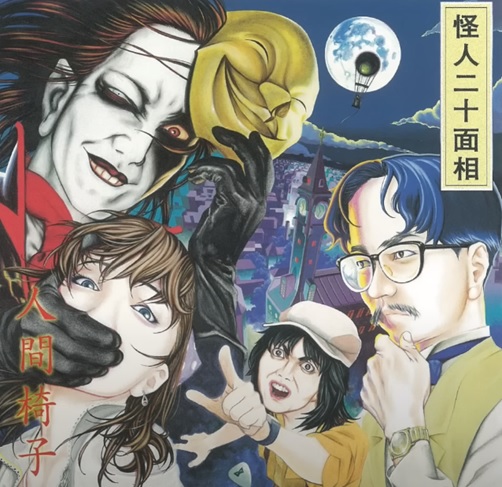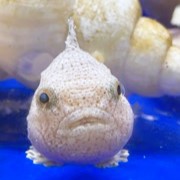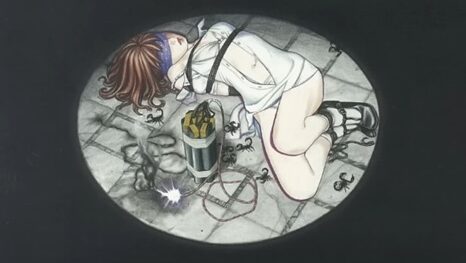さてさてさて。第9弾!です。
記念すべき最初の邦楽は~、たた~ん♪
「人間椅子 / Ningen Isu」の「芋虫 / Imo Mushi / The Caterpillar」です。
伝説?の番組「三宅裕司のいかすバンド天国」(いか天)にも出演していたらしいです。
いか天リアルで見てたけど記憶にないです。
ごめんなさい。m(_ _)m
もうとにかくサイコーです。
ふぁっきん・ぐ~です。
いままで続けてきてくれて感謝、感激、雨、アラレ(嵐じゃないよ)です。古っ(笑)
さぁ、Let’s get started!!
English lyrics are available!
ジャケット
芋虫が収録されている「怪人二十面相」の国内版アルバムのジャケットです。
イラストは大越 孝太郎さんという漫画家らしいです(趣あってよい~

曲の紹介
中毒性のあるベースライン、慟哭と憂愁を纏ったギターの音色から始まります。
で、ベースとギターのパートがスイッチするんです(表現合ってるかな?
もう、すべてがかっこいい!!
鈴木さんのボーカル・ベースがすばらしい!
和島さんのギータがすばらしい!
後藤さんのドラムがすばらしい!
歌詞もすばらしい!
曲もすばらしい!
最高っす!!
んで図書館いってみたのですよ!
芋虫借りて読みました~。
人間の陰と陽、光と闇が交差し混沌と描写されていました。
短編なのに読みごたえがあります。

小学生のころ学校の図書館で少年探偵団シリーズを借りて読んだことがあります。(きっとみなさんもあるはず?)
でもさすがに芋虫は読んだことありませんでしたよ!(あるかっ!
嫁のロイ子曰く「意外に切ない…
人生に何の希望も持てないし、手足もなければ視覚と触覚以外の五感もない。けど食欲、性欲と睡眠欲は当たり前にある。そんな少尉の慟哭と憂愁、怨嗟と遺恨の念を歌詞と曲とでみごとに表現していると思います。
結論:わからん!!
つまり「陰と陽」、「善と悪」、「男と女」、「愛と憎」のように物事には二元性があると言われている(よね)。しかしながら、それらが混沌として存在している状態あるいは状況も考えられる(はず)。
昨今云われるダイバーシティはそうだったりする(要は二元性だけではなく、ありとあらゆるマイノリティを認め合う。そこにはある種の混沌、曖昧さが存在する)のかな?と考えたり、考えなかったり、ラジバンダリ(古っ!)。
江戸川乱歩先生すげー、って勝手になりました。
では「人間椅子」で「芋虫」です。ちぇけら!
Now “Ningen Isu“, song is called “Imo Mushi“. Check it out!
さてさてどうでしたか?
だんなも新人「人間椅子」なのですがロイ子を信者にしようと頑張っています。
ちょっとウザがられてるけど…
みなさんも好きになってくれたら嬉しいです。
ではまた次回会いましょう。
ばいなら、ばいなら、ばいなら。
歌詞、クレジット / Lyric, Credits
歌詞やクレジットなどに関する情報です。
他にもあったほうがいいなって思う情報があれば随時追加していきます。
江戸川乱歩 / Edogawa Ranpo – 芋虫 / Imo Mushi / The Caterpillar
「芋虫」は「江戸川乱歩」の小説にインスパイアされた楽曲です。
WiKiには概要が載ってますので手っ取り早く知りたい方はどうぞ。
興味のある方はebookさんで試し読みできます。表紙もきれいですよね。
この短編小説からインスパイアされて素晴らしい歌詞と曲ができたんですね。
is short story published in the Jan. 1929 issue of the magazine “Shinseinen”.
- Tokiko Sunaga: The main character of the story. She finds joy in tormenting her husband.
- Lieutenant Sunaga: Tokiko’s husband. He was injured in the war and has lost the functionality of most of his body. He is awarded the Golden Kite Medal.
- Major Washio: A reserve major who rents a house to the Sunaga couple.
Summaries are,
- Mrs. Tokiko, who married Lieutenant Sunaga, a wounded soldier, had a peculiar inclination.
- It involved deriving pleasure from tormenting her husband, who had lost most of his senses, including both arms and legs, hearing, and taste, due to the war, leaving only his vision and sense of touch intact.
- Her husband was completely defenseless, like a helpless caterpillar, no matter what she did to him.
- The stark contrast between his hideous appearance and her own intact body unwittingly intensified her sadistic desires.
- One day, Tokiko is afraid that her husband’s eyes, which are the organ that connects him to the outside world, are too pure, so she crushes those eyes.
- Seeing her husband in agony, she repents of her wrongdoing and apologizes by writing her “Yurushite” (forgive me) on his body with her finger.
- Soon after, Lieutenant Sunaga disappears.
- Tokiko searches for her husband with her landlord, Major Washio, and discovers a scribbled “Yurus” (forgive you).
- Later, while searching the garden, they heard the sound of something falling into an old well that opened in the garden.
This short story, “Imo Mushi”, inspired Kenichi Suzuki, bass player of the band, to wright great lyric and to compose the great song!!!
詩の世界 日本語の活用について
日本文化の発信と日本語から英語への変換の研究を目的として、歌詞は日本語と英語の両方載せます。
以下、この節の太字は「人間椅子 / 芋虫」の歌詞からの引用となります。
ひねもす隠れ
hinemosu kakure
I remain in hiding all day long.
“hinemosu(hi.ne.mo.su)” is a very old word which has been used from Heian era about A.D. 800. to today means all day long.
It’s rarely used today (I think), and I had no idea of this word, so I needed a dictionary in fact.
ひねもす食らう
hinemosu kurau
I remain in eating all day long.
何も判らず
nani mo wakara zu
Nothing can be recognized either.
“zu” is attached to the verb (Mizenkei form) and is used to negate a verb. Also, it implies that the state or action is ongoing.
“mo” is attached to the noun and is used to emphasize the meaning of a noun.
By the way, “zu” is more common in “Kobun” (classical literature) and we ordinary use modern negative ending “nai”.
何も遺さず
nani mo nokosa zu
Nothing can be left behind either.
何も… 何も…
nani mo… nani mo…
Nothing either… Nothing either…
俺は芋虫 貪るだけの
ore wa imo mushi musaboru dake no
I am a caterpillar, is just devouring.
俺は芋虫 肥えていくだけの
ore wa imo mushi koete iku dake no
I am a caterpillar, is just getting fat.
闇に蠢き
yami ni ugomeki
Squirming in the dark,
闇に悶える
yami ni modaeru
Agonizing in the dark,
何も得られず
nani mo erare zu
Nothing can be gained either.
何も叶わず
nani mo kanawa zu
Nothing can be realized either.
何も… 何も…
nani mo… nani mo…
Nothing either… Nothing either…
俺は芋虫 醜いだけの
ore wa imo mushi minikui dake no
I am a caterpillar, is just an ugly thing.
俺は芋虫 卑しいだけの
ore wa imo mushi iyashii dake no
I am a caterpillar, is just a greedy thing.
俺は芋虫 嫌らしいだけの
ore wa imo mushi iyarashii dake no
I am a caterpillar, is just an obscene thing.
ああ ずるずると血膿のぬめる肉塊
ah zuru zuru to chiumi no numeru nikukai
Ah a body chunk with slimy bloody pus.
ああ どろどろとはらわた腐る肉塊
ah doro doro to harawata kusaru nikukai
Ah a body chunk with mushy rotten guts.
These words are onomatope that symbolically expresses sounds and voices in the natural world, as well as the state and movement of things.
- zuru zuru … state of dragging something or sound of it.
- doro doro … state of something being mushy.
- gutsu gutsu … state of boiling something or sound of it.
ああ 朽ちていく 朽ちていく 朽ちていく
ah kuchite iku kuchite iku kuchite iku
Ah getting rotten, getting rotten, getting rotten.
ああ ぐつぐつと煮えくり返る肉欲
ah gutsu gutsu to niekuri kaeru nikuyoku
Ah lust with seething being turned over and over.
ああ どろどろと虚しくよどむ肉欲
ah doro doro to munashiku yodomu nikuyoku
Ah lust with stagnating mushy and vainly.
ああ 堕ちてゆく 堕ちてゆく 堕ちてゆく
ah ochite yuku ochite yuku ochite yuku
Ah falling down, falling down, falling down.
どうですか?
歌詞をみると前述した「江戸川乱歩」の「芋虫」の世界観をみごとに表現しているのが分かるかと思います。
引用している歌詞については批評、研究(言語間の変換、異文化の交流・情報発信など)の目的で行なっており、著作者の権利を侵害する目的ではありません。
クレジット / Credits
芋虫 / Imo Mushi:人間椅子 / Ningen Isu
リリース:2000年6月
作詞/作曲:鈴木健一
ボーカル:鈴木健一
ギター:和嶋慎治
ベース:鈴木健一
ドラム:後藤マスヒロ







コメント